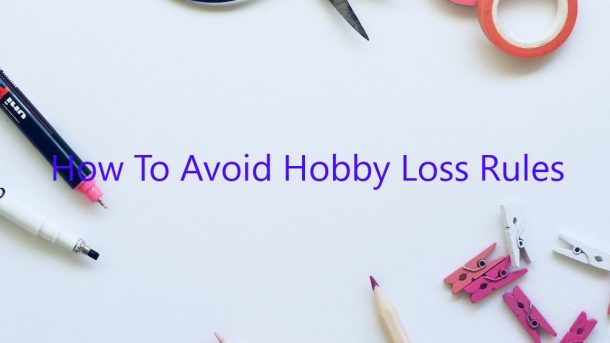The Internal Revenue Service (IRS) is tasked with the responsibility of ensuring that individuals and businesses pay the correct amount of taxes. One way the IRS does this is by auditing tax returns. If the IRS determines that you have underreported your income or claimed improper deductions, they can impose penalties and interest. One area where taxpayers can often make mistakes is in the area of hobby expenses. The IRS has specific rules for how to report hobby expenses. If you do not follow these rules, you could end up paying more in taxes than you should.
The first thing you need to do is determine if your activity is a hobby or a business. The IRS uses a number of factors to make this determination, including the amount of time you spend on the activity, the amount of money you make from the activity, and whether you are pursuing the activity for profit. If the IRS determines that your activity is a hobby, you are allowed to deduct your expenses up to the amount of your income from the activity. However, if the IRS determines that your activity is a business, you are allowed to deduct your expenses up to the amount of your net income from the activity.
In order to determine if your activity is a business or a hobby, you need to keep track of your expenses and income. You should keep track of how much you spend on supplies, advertising, travel, and other expenses related to the activity. You should also track the income you receive from the activity. This includes income from sales, fees, commissions, and any other source.
If you are unsure whether an expense is related to your hobby or business, you can ask the IRS for guidance. The IRS has a number of publications that discuss the rules for hobby expenses. You can find these publications on the IRS website.
It is important to be aware of the rules for hobby expenses so that you can avoid penalties and interest from the IRS. By following the rules, you can ensure that you are reporting your expenses correctly and that you are not paying more in taxes than you should.
Contents [hide]
How does IRS determine a hobby?
The Internal Revenue Service (IRS) is responsible for determining whether an activity is considered a hobby or a business. There are a number of factors that the IRS considers when making this determination.
One of the main factors that the IRS looks at is whether the individual has been engaged in the activity for profit. The IRS will look at things such as how much money the individual has made from the activity and whether any expenses have been deducted.
The IRS will also look at whether the individual has made a profit in the past. If the individual has not made a profit in the past, the IRS will look at whether the individual has the intention of making a profit in the future.
The IRS will also look at the individual’s motives for engaging in the activity. If the individual is engaged in the activity for personal pleasure or recreation, the IRS is more likely to classify the activity as a hobby.
If the individual is engaged in the activity in order to make a profit, the IRS is more likely to classify the activity as a business. However, there is no hard and fast rule, and the IRS will make a determination on a case-by-case basis.
Are hobby losses allowed?
There are many taxpayers who have a hobby and are wondering if they are able to claim the losses from the hobby on their tax return. The answer to this question is not a simple yes or no. The Internal Revenue Service (IRS) has specific rules that must be followed in order to claim a loss on a hobby.
Generally, in order to claim a loss on a hobby, the activity must be undertaken for profit. This means that the taxpayer must be able to show that they are trying to make a profit and that the losses are not just a result of pursuing the hobby. There are a few exceptions to this rule, such as if the hobby is an activity that the taxpayer is engaged in for religious, charitable, or other similar reasons.
In order to determine if a taxpayer is engaged in a hobby for profit, the IRS will look at a number of factors. Some of the factors that will be considered include the time and effort the taxpayer puts into the activity, the amount of money the taxpayer has lost or gained from the activity, and whether the taxpayer has made a profit in similar activities in the past.
If the taxpayer is not able to show that the hobby is being pursued for profit, the losses from the activity cannot be claimed on their tax return. However, if the taxpayer is able to meet the requirements to claim the losses, the losses can be used to reduce their taxable income.
Can you deduct hobby expenses 2022?
In general, you cannot deduct hobby expenses from your taxes. This is because hobby expenses are considered personal expenses, and are not considered business expenses. However, in some cases, you may be able to deduct hobby expenses if you can prove that you are engaged in the hobby with the intent to make a profit.
If you are able to deduct your hobby expenses, the amount that you can deduct will be limited to the amount of income that you generated from the hobby. This means that if you incur losses from your hobby, you will not be able to deduct those losses from your taxes.
There are a few things to keep in mind if you are trying to deduct your hobby expenses. First, the activity that you are engaged in must be considered a hobby, and not a business. Additionally, you must be able to demonstrate that you are engaged in the hobby with the intent to make a profit. This can be done by keeping track of your expenses and income related to the hobby, and showing that you have a history of making a profit from the hobby.
If you are able to deduct your hobby expenses, there are a few things that you will need to keep in mind. First, the amount that you can deduct will be limited to the amount of income that you generated from the hobby. This means that if you incur losses from your hobby, you will not be able to deduct those losses from your taxes. Additionally, you must be able to demonstrate that you are engaged in the hobby with the intent to make a profit. This can be done by keeping track of your expenses and income related to the hobby, and showing that you have a history of making a profit from the hobby.
If you are thinking about deducting your hobby expenses, it is important to speak with a tax professional to determine if you are eligible to do so.
What is considered a hobby loss?
When it comes to taxes, there are certain things that you can and cannot write off. One common question is whether or not you can write off losses from your hobbies. The answer is not quite that simple.
There are two types of hobby losses: the first is losses from activities that are considered hobbies, and the second is losses from business activities that are considered hobbies. You can only write off losses from business activities that are considered hobbies if you are actually running the business as a hobby and not trying to make a profit.
If you are running the business as a hobby, you can only write off the expenses that are related to the hobby. This includes things like the cost of materials, supplies, and equipment used in the activity. You cannot write off your salary or other income from the business.
If you are not running the business as a hobby, you can write off all of the expenses related to the business, including your salary. However, you still have to report any income from the business on your taxes.
So, when it comes to hobby losses, the answer is a little more complicated than simply yes or no. It all depends on how the business is being run. If you are running it as a hobby, you can only write off certain expenses, while if you are running it as a business, you can write off all related expenses.
How much money can you make as a hobby before paying taxes?
As a general rule, you must pay tax on income you earn from your hobbies. The amount of tax you pay will depend on how much money you make from your hobby.
Income from a hobby is considered taxable income if you are engaged in the activity with the intent of making a profit. If you are not making a profit, the income from your hobby is not considered taxable. However, you may have to report any income you earn from the hobby on your tax return, even if you don’t make a profit.
There are a few exceptions to the rule that income from a hobby is taxable. For example, you don’t have to pay tax on income from a hobby if the activity is a part of your job. And, you may be able to claim a loss from a hobby on your tax return, even if the activity is considered taxable.
If you are not sure whether the income from your hobby is taxable, it is best to speak to a tax professional.
How much can you earn from a hobby before you have to declare it?
How much can you earn from a hobby before you have to declare it?
There is no one definitive answer to this question. The amount you can earn from a hobby before you have to declare it will depend on a number of factors, including the type of hobby, the amount of money you earn, and the tax laws in your country.
In most cases, if you earn a small amount of money from your hobby, you will not need to declare it. However, if you earn a significant amount of money from your hobby, you may need to declare it as income and pay taxes on it.
It is important to speak to an accountant or tax specialist to get specific advice on how much you can earn from your hobby before you have to declare it.
What is the threshold for hobby income?
What is the threshold for hobby income?
The threshold for hobby income is the point at which your hobby activity is considered to be a business for tax purposes. This means that you will need to start tracking your income and expenses from the activity, and may be required to pay income taxes on the profits from the activity.
There is no specific dollar amount that defines the threshold for hobby income. Rather, it is based on a number of factors, including the manner in which the activity is conducted, the amount of time and effort you put into it, and whether you are able to generate a profit from it.
If you are engaged in a hobby activity that you are doing mainly for pleasure and not to make a profit, you are not required to report the income from the activity on your tax return. However, if you do make a profit from the activity, you will need to report the income and pay taxes on it.
It is important to note that the threshold for hobby income is not the same as the threshold for self-employment income. The threshold for self-employment income is the point at which you are considered to be self-employed and are required to pay self-employment taxes.
If you are unsure whether your hobby activity meets the threshold for hobby income, it is best to consult with a tax professional.




